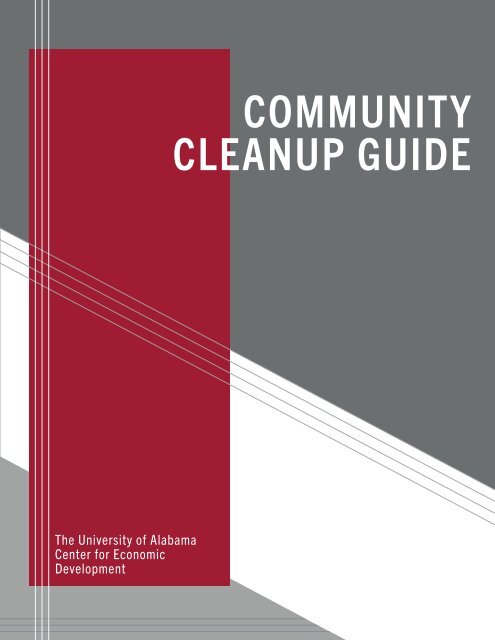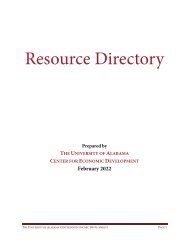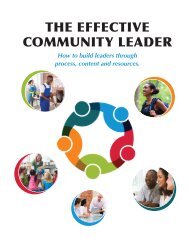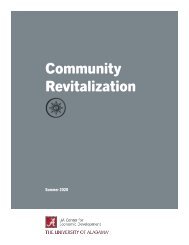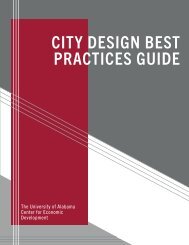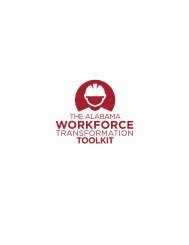Community Cleanup Guide
- No tags were found...
You also want an ePaper? Increase the reach of your titles
YUMPU automatically turns print PDFs into web optimized ePapers that Google loves.
The University of Alabama<br />
Center for Economic<br />
Development<br />
COMMUNITY<br />
CLEANUP GUIDE
Timeframe:<br />
Preparations for a successful clean-up project should begin at least 2 months in advance of the event. Organizing<br />
the event is very important. Review the information in this Toolkit, which serves as a guideline to assist you with<br />
planning your event. A checklist is provided.<br />
PLANNING THE CLEANUP<br />
Organize Your Crew<br />
Identify a Planning Committee of 3 to 6 volunteers to organize the project. This could include a local citizen, a member<br />
of government, local business owner, staff of your local school system, local church members, and youth within your<br />
community. Arrange a meeting of the Planning Committee to plan the event and assign roles throughout the project.<br />
This should be a FUN project, so choose individuals that will make the project fun AND competitive - so folks will work<br />
hard and be proud of the results! Individuals who have contacts in the community and are able to reach new sources of<br />
volunteers are vital, so forming the Planning Committee is key to ensuring success. Establishing a Planning Committee<br />
will spread the workload and enable you to plan an effective clean-up project. Plans are critical to help communities set<br />
goals and continue to grow the program successfully.<br />
Select a Volunteer Coordinator<br />
The coordinator, or co-coordinators will guide the committee<br />
as project plans are developed to outline the methods the group<br />
will use to generate awareness and motivate volunteers. The<br />
plans should include detailed activities that will take place<br />
during the event. Assign the Planning Committee tasks during<br />
the planning process as well as throughout the event. Your<br />
plan should include the following: Name your clean-up project;<br />
Select a date; How many teams will you need; How long will your<br />
clean-up project last – determine beginning and ending times; How<br />
will you get needed supplies; How will trash bags be distributed;<br />
Who will take photos; Who will distribute water, how will it be<br />
distributed; Who will check-in volunteers on the day of the event;<br />
What information do you need at check-in (i.e. name/phone/email,<br />
etc.); Who will give assignments as to where the teams begin the project; Who will man a First Aid station; What is the plan for<br />
disposal of the trash; Who will handle marketing the event; What kind of signage is needed; Who will send thank you – will they<br />
be sent via e-mail, Facebook, local newspaper, etc.<br />
The University of Alabama Center for Economic Development - How to Organize a Successful <strong>Cleanup</strong> Project Page 2
Select a Date<br />
Select a date to launch the clean-up project. An ideal day to hold a clean-up project is on Earth Day - April 22 or<br />
a Saturday before or after the celebrated day. “Changing the world starts by changing your own little corner of it.”<br />
Organizing an Earth Day event or activity is one of the best ways to engage your community to protect the planet.<br />
Review the section: Other Resources to Consider to learn how to obtain an Earth Day Toolkit.<br />
Choose a Location<br />
Identify areas in your<br />
community to be cleaned that are safe<br />
and accessible. Be creative! It may be<br />
that you need to plan for consecutive<br />
clean-up projects depending on the<br />
needs in your community. Be sure to<br />
contact the appropriate individuals to<br />
ensure that you have permission to be<br />
there and determine what to do with<br />
the trash and recyclables you collect.<br />
You may need to check with your local<br />
sanitation department, neighborhood<br />
associations, Park and Recreation<br />
Authority to get approval. Be sure to<br />
ask if a permit is required.<br />
Possible Locations for Your<br />
<strong>Cleanup</strong> Project:<br />
- Parks<br />
- Neighborhoods<br />
- Vacant lots<br />
- Roadsides<br />
- Schoolyards<br />
- Town Square<br />
Possible Groups to Contact to Find Volunteers:<br />
- Local Churches/Schools (elementary, middle and high<br />
school)<br />
- Civic Groups: Kiwanis, Rotary, Jaycees, Civitan<br />
- Boys & Girls Clubs<br />
- Boy Scouts/Girl Scouts Troops<br />
- 4-H Groups<br />
- Neighborhood Associations/Garden Clubs<br />
- Professional Associations<br />
- Local Businesses<br />
- Media (local newspaper/radio/TV station): utilize the<br />
media to attract volunteers and reinforce your message<br />
about the project.<br />
Recruit Volunteers<br />
Sometimes it’s easier to recruit groups rather than<br />
individuals to participate in a community activity like<br />
a clean-up project. Contact local churches and schools<br />
to ask them to help form teams of volunteers. Consider<br />
organizing contests between teams to get them<br />
enthused.<br />
Encourage friends, family, local citizens, private land<br />
owners, churches and schools, neighbors, local business<br />
owners, to participate in the project. And don’t forget<br />
to include the YOUTH in your community. Remember,<br />
there is POWER in numbers! Get people together,<br />
get them personally motivated to succeed! You may<br />
also wish to recruit family groups that include two to three generations of participants. What a great story for your local<br />
newspaper and radio stations to highlight: “Three Generations Join in the ‘Sign-Up to Clean-Up’ Project”.<br />
Sponsors/Support Organizations<br />
Determine if you will need sponsors for your event.<br />
Sponsors can be asked to donate trash bags, bottled<br />
water, snacks, disposable hand wipes, hand sanitizer,<br />
poster board for signage, buckets, recycle containers,<br />
tape or zip-ties to tie up bags, First Aid supplies, etc.<br />
They may even donate manpower, or assist with printing<br />
flyers, printing of T-shirts, etc. Ask local businesses to<br />
donate prizes to be presented to the team that collects<br />
the most number of bags of litter. You may consider<br />
using a luggage scale or fish scale to weigh the bags<br />
collected, and present prizes to the team that collects<br />
the most pounds of trash. If you don’t ask for support,<br />
you won’t receive it!<br />
Possible Sponsors You May Consider<br />
- Local Businesses: Grocery Stores may donate trash<br />
bags, bottled water or snacks; local businesses may donate<br />
door prizes/incentives for the team members; your local<br />
hardware store may donate trash bags, buckets, recycle<br />
bins, etc. Make sure the local businesses understand<br />
that by supporting the clean-up project, they can build<br />
their business. Businesses want to connect with projects<br />
and activities that present a positive message to the<br />
community!<br />
- Local County Commission: Ask the Commission to<br />
provide dumpsters (free of charge) in various locations<br />
during the clean-up event to make the community<br />
more beautiful.<br />
The University of Alabama Center for Economic Development - How to Organize a Successful <strong>Cleanup</strong> Project Page 3
Develop a Marketing Plan and Publicize<br />
Your marketing plan could be as simple as: 1) Facebook posts<br />
– letting people know WHEN the clean-up event will take<br />
place. Include the date, time of event, where the event will<br />
begin, and how individuals can participate (see right for an<br />
example). 2) Flyers: Develop a flyer with the same information<br />
as the Facebook post, hang in store windows, put on car<br />
windshields at the local grocery store, hardware store, include<br />
information in church bulletins, etc. 3) Ask business owners<br />
to include details about the clean-up event on their websites,<br />
store windows/doors, etc. 4) Contact your local newspaper,<br />
radio stations to publicize; 5) Ask the Chamber to add to their<br />
website, etc.<br />
Sample<br />
Facebook<br />
Post:<br />
Get Supplies<br />
Determine what kinds of supplies you will need (work gloves<br />
[or have volunteers bring gloves], trash bags, buckets, trash<br />
receptacles, etc.; bottled water, snacks, sign-in sheet for<br />
volunteers [to enable you to thank the volunteers via e-mail],<br />
First Aid kit for minor cuts and scrapes, zip ties; hand sanitizer,<br />
disposable hand wipes, poster board and markers, shovels,<br />
rakes, etc.<br />
DURING THE CLEANUP<br />
Have a Planning Committee member take photos of the event, distribute water and snacks.<br />
Have a Planning Committee member stay at the check-in location in case of emergencies<br />
Instruct volunteers what to do with the filled bags of trash.<br />
Have Planning Committee members pick up filled bags and take to designated drop-off locations.<br />
AFTER THE CLEANUP<br />
Express your THANKS by sharing the results! Include<br />
photos and a short article in the local newspaper and<br />
town website identifying the volunteers, and include<br />
the number of trash bags collected or the weight of all<br />
trash (if using scales).<br />
Send a Facebook post or e-mail to volunteers saying<br />
“Look What We Collected” with photos and the<br />
number or pounds of bags collected. This will more<br />
than likely encourage others to participate in future<br />
events! Ask volunteers to share their own stories,<br />
experiences and personal photos on Facebook, etc.<br />
Identify ANOTHER clean-up day while the enthusiasm<br />
is high!<br />
SAFETY TIPS<br />
Find a Planning Committee member that has medical training or knows basic First Aid in case of a health emergency.<br />
When determining the sites to be cleaned, keep in mind to look for poisonous plants, power lines, broken glass or sharp<br />
items or other safety hazards. Encourage volunteers to dress appropriately, and wear tennis shoes or boots.<br />
WHAT DID YOU LEARN?<br />
Keep a record of your success, and make notes on how you can improve the next clean-up project.<br />
The University of Alabama Center for Economic Development - How to Organize a Successful <strong>Cleanup</strong> Project Page 4
NOTES:<br />
The University of Alabama Center for Economic Development - How to Organize a Successful <strong>Cleanup</strong> Project Page 5
OTHER RESOURCES TO CONSIDER<br />
The U. S. Army Corps of Engineers: (1-800-865-8337) – has a hotline to match you up with opportunities.<br />
https://search.usa.gov/search?utf8=%E2%9C%93&affiliate=mobile_district&query=clean+up<br />
The Nature Conservancy: working to protect Alabama for people and nature; assist with getting rid of invasive species,<br />
cleaning up natural areas, maintaining fences, assist with prescribed burns. https://www.nature.org/en-us/get-involved/<br />
how-to-help/places-we-protect/?s=Alabama<br />
National Earth Day - April 22: - Visit the website for an Earth Day Toolkit where you will find everything you need to<br />
organize an event in your area. http://www.earthday.org/?s=tool+kit+for+earth+day<br />
National Public Lands Day: (usually near the end of September) – they help find ways to give volunteers a way to get<br />
involved. https://www.nps.gov/subjects/lwcf/planningprojects.htm<br />
Alabama Power Company/Alabama Power Foundation/Alabama Power Service Organization<br />
and Energizers: Retirees involved in their communities support a range of environmental programs and are involved<br />
in many community service projects. https://www.alabamapower.com/our-company/in-the-community/communityprograms.html<br />
Alabama RC&D Councils: nonprofit organizations that are made up of volunteers who identify the unmet needs in the<br />
communities and create solutions. http://alabamarcd.org/rcd-councils-contacts/<br />
USDA Natural Resources Conservation Service: provide ways for people to plan projects that will make their<br />
communities a better place to live. https://www.nrcs.usda.gov/wps/portal/nrcs/main/al/people/volunteers/<br />
Alabama Cooperative Extension System: learn how a local Alabama county held their first<br />
county-wide clean-up day: http://offices.aces.edu/tallapoosa/throw-away-day-county-wide-cleanupsaturdayapril-23rd/;<br />
Alabama 4-H: http://www.aces.edu/4-H-youth/AL4-H/index.php<br />
Alabama Department of Environmental Management: learn about recycling, and how to enhance the awareness of<br />
recycling http://adem.alabama.gov/MoreInfo/pubs/ADEM<strong>Community</strong>Engagement.pdf -<br />
NOTES:<br />
The University of Alabama Center for Economic Development - How to Organize a Successful <strong>Cleanup</strong> Project Page 6
CHECKLIST<br />
Two Months Before Event<br />
Identify Planning Crew – arrange initial planning meeting, assign duties, select a coordinator or<br />
co-coordinators for the project<br />
Confirm clean-up date/time/location (obtain permission from land owner – check to see if permits are required)<br />
Confirm cleanup boundaries – arrange for drop-off locations with the sanitation department<br />
Contact County Commission to request free dumpsters and/or coordinate with local waste haulers and recyclers<br />
on the pickup, transport and disposal of the collected trash/litter/recyclables. Determine drop-off locations<br />
for trash<br />
Contact Sponsors/Supporters to request supplies (trash bags/buckets/recycle bins/ bottled water/snacks/First Aid<br />
kit for minor scrapes/T-shirts (optional), poster board for signage, hand sanitizer, disposable gloves, etc.<br />
Planning Committee discuss how and who to recruit for volunteers; determine if sign-up forms are needed<br />
Begin the process of promoting the event to:<br />
Local Churches; Local Schools; Civic Groups: Kiwanis/Rotary/Jaycees/Civitan; Boy Scout and Girl Scout Troops;<br />
4-H Groups; Neighborhood Associations; Garden Clubs; Professional Associations; Local Businesses; Media<br />
Coverage: Local Newspaper, Local Radio Stations, Local TV Station<br />
1) develop Facebook/website blurb (see sample)<br />
2) develop flyer to promote to businesses/schools/churches through church<br />
bulletins/newsletters/website (see sample)<br />
One Month Before Event<br />
Hold additional Planning Committee Meeting to report on number of volunteers to participate – continue with<br />
recruitment and report on Sponsor/Supporter confirmations<br />
Plan an agenda for your clean-up day<br />
Review plan for drop-off locations for all collected materials and confirm transport and disposal of the collected<br />
trash/litter/recyclables.<br />
Confirm permits (if required) are obtained to secure a safe event<br />
Confirm Sponsor/Supporters and arrange for pick-up of donated supplies<br />
Two Weeks Before Event<br />
Check, check and triple check logistics!<br />
Follow up and confirm plans and dates with local waste haulers/recyclers regarding pickup, delivery and disposal<br />
of collected litter/recyclables<br />
One Week Before Event<br />
Make Signs for Check-In and First Aid Station<br />
Pick up Supplies, arrange for ice if needed for water<br />
Planning Committee meet to review the clean-up plan<br />
Review Planning Committee assignments<br />
Assign Planning Committee member to bring table/chairs for check-in and First Aidstations<br />
Day of Event<br />
Set up Check-in Station and First Aid Station<br />
Distribute trash bags to specific locations<br />
Make sure site coordinators are in place at designated locations!<br />
Smile and have FUN!<br />
Thank everyone involved!<br />
The University of Alabama Center for Economic Development - How to Organize a Successful <strong>Cleanup</strong> Project Page 7


